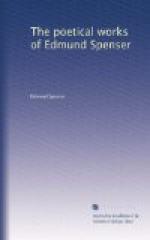* * * * *
FOOTNOTES:
Ver. 8.—Verlame. Veralam, or Verulamium, was a British and Roman town, near the present city of St. Alban’s in Hertfordshire. Some remains of its walls are still perceptible. H.
Ver. 64.—Th’Assyrian Lyonesse. These types of nations are taken from the seventh chapter of the book of Daniel. H.
Ver. 190.—I saw him die. Leicester died at Cornbury Lodge, in Oxfordshire. Todd suggests that he may have fallen sick at St. Alban’s, and that Spenser, hearing the report in Ireland, may havo concluded without inquiry that this was the place of his subsequent death, C.
Ver. 225.—Colin Cloute. Spenser
himself, who had been befriended by
Leicester. H.
Ver. 239.—His brother. Ambrose Dudley, Earl of Warwick.
Ver. 245.—His noble spouse. Anne,
the eldest daughter of Francis
Russell, Earl of Bedford.
Ver. 260.—His sister. Lady Mary Sidney.
Ver. 261.—That good earle, &c.
This Earl of Bedford died in 1585.—
TODD.
Ver. 267.—He, noble bud, &c. Edward Russell, grandson of Francis Earl of Bedford, succeeded in the earldom, his father, Francis, having been slain by the Scots.—OLDYS.
Ver. 275.—That goodly ladie, &c.
Lady Mary Sidney, mother of Sir
Philip Sidney and the Countess of Pembroke.
Ver. 281.—Most gentle spirite. Sir Philip Sidney.
Ver. 317.—Thine owne sister, &c. The Countess of Pembroke, to whom this poem is dedicated. “The Dolefull Lay of Clorinda” (Vol. IV. p. 426) appears to have been written by her.
Ver. 436.—Good Melibae. Sir Francis Walsingham, who died April 6,1590. The poet is Thomas Watson.—OLDYS.
Ver. 447-455.—These lines are aimed at Burghley, who was said to have opposed the Queen’s intended bounty to the poet. C.
Ver 491.—These allegorical representations of the vanity of exalted position, stately buildings, earthly pleasures, bodily strength, and works of beauty and magnificence, admit of an easy application to the splendid career of the Earl of Leicester,—his favor and influence with the Queen, his enlargement of Kenilworth, his princely style of living, and particularly (IV.) his military command in the Low Countries. The sixth of these “tragick pageants” strongly confirms this interpretation. The two bears are Robert and Ambrose Dudley. While Leicester was lieutenant in the Netherlands, he was in the habit of using the Warwick crest (a bear and ragged staff) instead of his own. Naunton, in his Fragmenta Regalia, calls him Ursa Major. C.
Ver. 497.—The holie brethren, &c. Shadrach, Meshach, and Abednego. Daniel, ch. iii. C.
Ver. 582-586.—A paraphrase of Sir Philip’s last words to his brother. “Above all, govern your will and affection by the will and word of your Creator, in me beholding the end of this world with all her vanities.” This is pointed out by Zouch, Life of Sidney, p. 263. C.




